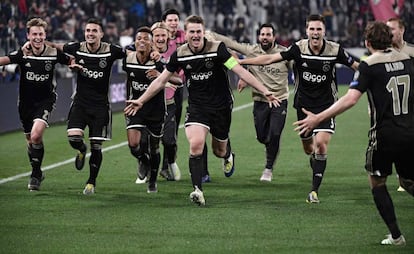The Champions League and the legacy of Johan
Ajax and Tottenham are seeing their dreams come true, making something that looks very complicated simple: winning with a well-defined identity

My father always used to say that technique was not a question of being a juggler with the ball, but rather sending it to its destination with the fewest touches possible, facilitating the movement of your teammate. That is the meaning behind his famous phrase, which this week came back into relevance: “Playing football is very simple, but playing simple football is the hardest thing there is.” His words don’t just serve to illustrate the feat that Ajax pulled off in Turin. I would extend them to all of the semifinalists in the Champions League and also Manchester City, who were eliminated from the tournament after scoring four goals. All of them are protagonists with the ball.
What is needed is an identity around which the planning of an entire project can revolve – from the offices and the bench, to the very pitch itself
That phrase has a huge amount of truth to it, because a lot of the time we complicate soccer when, deep down, it’s a simple game. And making it simple requires a lot of hours of work at the training ground based on a clear idea. What is needed is an identity around which the planning of an entire project can revolve – from the offices and the bench, to the very pitch itself. And that is also a difficult task in current times, with owners or chairmen who are more concerned about an immediate return on their investment than about creating a legacy. What’s fundamental is to get to the very DNA of a club: Guardiola and City are a perfect combination, but so are Atleti and Simeone – who, by the way, I do not see as a defensive coach, but one who is very intense, and who gets the most out of the transitions of his team.
When Pep Guardiola stated that he had not gone to Manchester City to win the Champions League, but rather to change their way of playing soccer, it did not appear to me to be an attempt to put a bandage on before the wound. It was more a way of taking the pressure off a team with a huge budget when it comes to attracting players, but that still is lacking the condition of favorite in Europe that is only bestowed on you by the weight of history. It would be unfair to demand that their consecration in the continental elite be fast-tracked. That growth does not just depend on money – it would be like putting the cart before the horse. It is also about finding an identity upon which the foundations of the project are based. And Guardiola is guiding the club in the creation of its DNA.
Ajax and Tottenham are the positive and enjoyable surprises of this year’s Champion’s League
This way of understanding soccer is also associated with the image of the Manchester City brand and its franchises all around the world, which follow the same road map that was opted for by its directors Ferran Soriano and Txiki Begiristain – first with the incorporation of Pellegrini and then Guardiola. Because the beautiful game is also an asset in the entertainment industry. The public demands emotion, and there is no greater spectacle than the one that was offered to us by Manchester City and Tottenham, a drama that was played out by two brave teams and that could have been ripped from the pages of a Hollywood script.
I coincided with Mauricio Pochettino at Espanyol during a complicated year during which we barely saved ourselves from being relegated. At the time he was already showing his mettle as a leader, with that competitive gene that is so common in Argentines as well as a strong organizational instinct. His Tottenham is also a daring team, because incorporating a handful of former Ajax players on his staff is a statement of intent in itself. There should be no demands either on Pochettino to secure a trophy to consecrate his project, because having given Tottenham a DNA that has placed the club on an upward trajectory already has enough merit, having committed to a youthful team in the face of a lack of budget.
Ajax and Tottenham are the positive and enjoyable surprises of this year’s Champion’s League. It’s normal for Barça to get to the semifinals, and for Liverpool to be among the four best teams is always a possibility. But Ajax and Tottenham are seeing a dream come true, making something that seems very complicated simple: winning with a well-defined identity.
Tu suscripción se está usando en otro dispositivo
¿Quieres añadir otro usuario a tu suscripción?
Si continúas leyendo en este dispositivo, no se podrá leer en el otro.
FlechaTu suscripción se está usando en otro dispositivo y solo puedes acceder a EL PAÍS desde un dispositivo a la vez.
Si quieres compartir tu cuenta, cambia tu suscripción a la modalidad Premium, así podrás añadir otro usuario. Cada uno accederá con su propia cuenta de email, lo que os permitirá personalizar vuestra experiencia en EL PAÍS.
¿Tienes una suscripción de empresa? Accede aquí para contratar más cuentas.
En el caso de no saber quién está usando tu cuenta, te recomendamos cambiar tu contraseña aquí.
Si decides continuar compartiendo tu cuenta, este mensaje se mostrará en tu dispositivo y en el de la otra persona que está usando tu cuenta de forma indefinida, afectando a tu experiencia de lectura. Puedes consultar aquí los términos y condiciones de la suscripción digital.









































